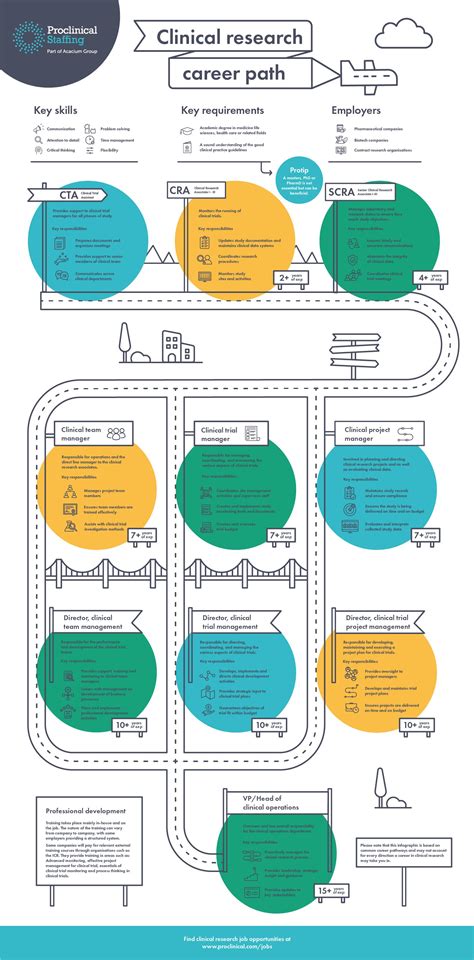In the ever-evolving healthcare landscape, clinical research plays a fundamental role in advancing medical knowledge and improving patient outcomes. A career in clinical research offers individuals the opportunity to contribute directly to the discovery of new therapies, the advancement of medical knowledge, and the improvement of healthcare delivery.

Understanding the Importance of Clinical Research
According to the National Institutes of Health (NIH), clinical research is responsible for numerous breakthroughs that have revolutionized healthcare, extending lifespans and improving the quality of life for millions. These include:
- The development of vaccines that prevent diseases such as polio, measles, and tetanus
- The creation of antibiotics that have significantly reduced the mortality rate from infectious diseases
- The discovery of cancer treatments that have increased survival rates
- The advancement of surgical techniques that have improved outcomes and safety
Embarking on a Clinical Research Career
To embark on a clinical research career, individuals typically follow a step-by-step approach:
- Pursue a Bachelor’s Degree: A bachelor’s degree in a health-related field, such as biology, nursing, or public health, is typically required as the foundational education.
- Gain Experience: Volunteer or work in a clinical research setting to gain practical knowledge and build a network.
- Complete a Master’s Degree: A master’s degree in clinical research, biostatistics, or a related field is often preferred by employers.
- Obtain Certification: Professional certification demonstrates expertise and credibility in the field. The Clinical Research Professional (CRP) certification is widely recognized.
Career Pathways in Clinical Research
A career in clinical research offers a wide range of specializations and career paths. Some of the most common include:
- Clinical Research Coordinator: Manages and coordinates clinical trials, ensuring compliance with regulations and ethical guidelines.
- Clinical Research Associate: Provides support to clinical trial teams, assists in data collection, and maintains patient records.
- Clinical Research Manager: Oversees multiple clinical trials, ensures timelines are met, and provides guidance to the research team.
- Clinical Trial Investigator: Designs, conducts, and analyzes clinical trials, evaluating the safety and efficacy of new interventions.
- Medical Writer: Prepares scientific documents, regulatory submissions, and patient information materials related to clinical trials.
Pros and Cons of a Clinical Research Career
Pros:
- Meaningful Work: Contribute to the advancement of medical knowledge and the development of new treatments.
- High Demand: The healthcare industry is constantly expanding, creating numerous job opportunities in clinical research.
- Potential for High Earnings: Clinical research professionals with specialized skills and experience can earn competitive salaries.
Cons:
- Competitive Field: Securing employment in clinical research can be challenging due to the high number of qualified candidates.
- Stressful Environment: Clinical research can involve long hours and deadlines, which can lead to stress and burnout.
- Regulatory Compliance: Clinical research is heavily regulated, which can add complexity and time constraints to the work process.
Thought-Provoking Questions
Aspiring clinical researchers should consider the following questions:
- What is your motivation for pursuing a career in clinical research?
- Which areas of clinical research are you particularly interested in?
- What are the challenges and rewards you anticipate in this field?
- How can you distinguish yourself as a competitive candidate?
Innovative Applications of Clinical Research
Clinical research has the potential to yield groundbreaking applications in various areas:
- Personalized Medicine: Tailored treatments based on individual genetic makeup and lifestyle factors.
- Digital Health: Technologies that monitor health and facilitate remote patient management.
- Precision Medicine: Targeting specific biomarkers for personalized therapies and preventive interventions.
Tables for Reference
Table 1: Projected Growth of Clinical Research Jobs
| Job Title | Projected Growth 2020-2030 |
|---|---|
| Clinical Research Coordinator | 12% |
| Clinical Research Associate | 13% |
| Clinical Research Manager | 15% |
Table 2: Salary Ranges for Clinical Research Professionals
| Job Title | Average Salary |
|---|---|
| Clinical Research Coordinator | $60,000 – $80,000 |
| Clinical Research Associate | $70,000 – $90,000 |
| Clinical Research Manager | $90,000 – $120,000 |
Table 3: Professional Certifications in Clinical Research
| Certification | Description |
|---|---|
| Clinical Research Professional (CRP) | Comprehensive certification covering all aspects of clinical research. |
| Certified Clinical Research Coordinator (CCRC) | Specific certification for clinical research coordinators. |
| Certified Clinical Research Associate (CCRA) | Specific certification for clinical research associates. |
Table 4: Educational Pathways to a Clinical Research Career
| Level | Recommended Degree |
|---|---|
| Bachelor’s Degree | Biology, Nursing, Public Health |
| Master’s Degree | Clinical Research, Biostatistics, Epidemiology |
| Certification | Clinical Research Professional (CRP), CCRC, CCRA |
Conclusion
A career in clinical research presents a unique opportunity to make a tangible impact on the advancement of healthcare. By understanding the importance of the field, following the necessary steps, and continuously exploring innovative applications, aspiring clinical researchers can contribute to the discovery of new cures, improved treatments, and a healthier future for all.
